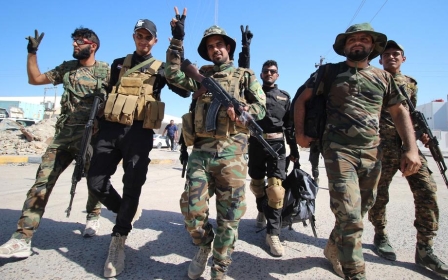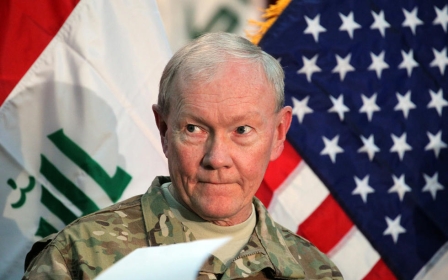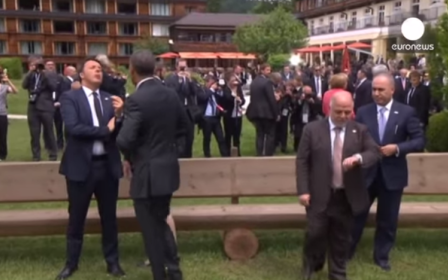Iraq's military strategy criticised by anti-IS coalition

The US Secretary of Defence called out Baghdad on Wednesday to send more recruits to American-run training camps, as Iraq struggles to battle the Islamic State group with a weakened military.
Plans to train some 24,000 Iraqi security forces by autumn are falling short, as only enough trainees for 7,000 troops and 2,000 "anti-terrorist forces" have enrolled for training, defence chief Ashton Carter said while speaking before the House Armed Services Committee.
"As I've told Iraqi leaders, while the United States is open to supporting Iraq more than we already are, we must see a greater commitment from all parts of the Iraqi government," Carter said.
Iraq's military has been weakened and suffered from poor morale ever since multiple divisions collapsed in the face of an offensive by IS last year.
Shia militias and Kurdish forces have been called on to stand in for the Iraqi military during offensives attempting to reclaim territory from IS.
Carter and General Martin Dempsey, the US military's top officer, told the House committee that they have not ruled out increasing US troop support for Iraq.
But they said such a boost requires the Iraqi military brings a more substantial force to battle IS, which holds large swathes of the north and west of the country.
Introducing more American troops is a subject the US will "need to revisit as those [Iraqi] forces are actually produced," Carter said.
US forces could bolster offensives, such as a much discussed Mosul campaign, but Dempsey stressed that such support should not be a crutch for the Iraqi government.
"The introduction of those resources should not be done on a habitual basis because we want them to understand this is their fight," Dempsey said.
"I would not recommend that we put US forces in harm's way simply to stiffen the spine of local forces," he said.
"If their spine is not stiffened by the threat of ISIL on their way of life, nothing we do is going to stiffen their spine," said Dempsey, using another acronym for IS.
President Barack Obama decided to send 450 additional troops to Iraq last week, bringing the total US force in the country to about 3,550.
Those forces, including 50 military advisers, are confined to consulting and training missions.
They will be based at the Taqaddum Air Base, to help Iraqi forces retake the city of Ramadi in the Sunni province of Al-Anbar.
Ramadi fell after 'unwarranted' Iraqi pullout
Meanwhile, a senior officer in the US-led anti-IS coalition said on Wednesday that the militants took the city of Ramadi because an Iraqi commander unnecessarily ordered his forces to withdraw.
"Ramadi was lost because the Iraqi commander in Ramadi elected to withdraw. In other words, if he had elected to stay, he would still be there today," the British army's Brigadier Christopher Ghika told journalists in Baghdad.
"Ramadi was not a Daesh victory - Daesh did not win Ramadi, Daesh did not fight and defeat the Iraqi army in Ramadi," Ghika said.
Iraqi security forces have been plagued by incompetent leaders, some of whom were political appointees, and dozens of officers have been sacked over the past year.
"It was the Anbar Ops commander" who gave the order, Ghika said, referring to the head of the military command responsible for Anbar province, of which Ramadi is the capital.
Staff Major General Mohammed Khalaf al-Fahdawi was acting head of Anbar Operations Command when Ramadi fell, as the commander had been injured.
Fahdawi said he could not comment because he did not have permission to speak about the issue.
Ramadi fell to IS in mid-May after government forces had held out against militants there for more than a year.
It was their worst setback in months after they had retaken significant territory in two provinces north of Baghdad.
The US-led coalition is waging a campaign of airstrikes targeting IS in Iraq and Syria, and also providing arms and training to Iraqi forces.
'Execution of 7,000 Sunnis'
Meanwhile, local Iraqi media outlets were reporting that Prime Minister Haider al-Abadi is seeking to authorise the Ministry of Justice to execute more than 7,000 predominately Sunni prisoners.
The prisoners were sentenced to death, but the capital punishment against them needed ratification by the presidency – which has thus far refused to do so.
They have been reportedly convicted of "terror" related charges, but many commentators have questioned the presence of a due process.
New MEE newsletter: Jerusalem Dispatch
Sign up to get the latest insights and analysis on Israel-Palestine, alongside Turkey Unpacked and other MEE newsletters
Middle East Eye delivers independent and unrivalled coverage and analysis of the Middle East, North Africa and beyond. To learn more about republishing this content and the associated fees, please fill out this form. More about MEE can be found here.




